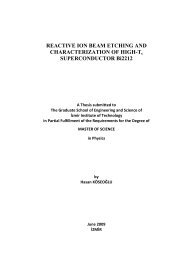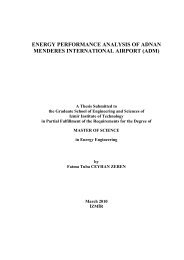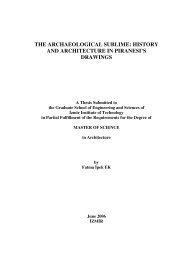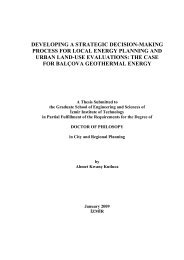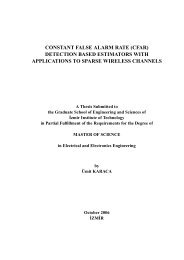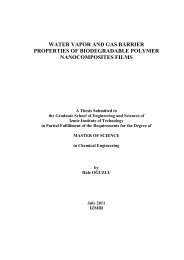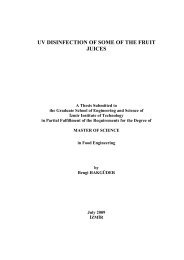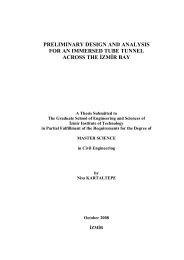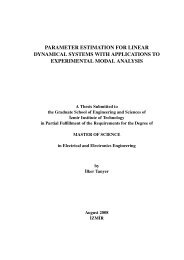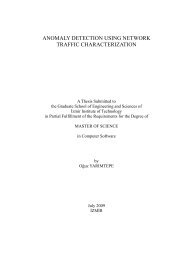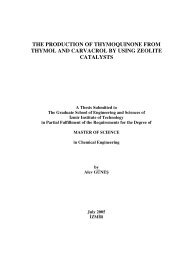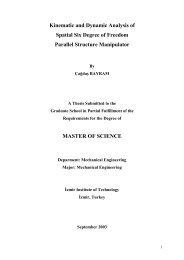a critical evaluation on the concept of justice in planning process
a critical evaluation on the concept of justice in planning process
a critical evaluation on the concept of justice in planning process
Create successful ePaper yourself
Turn your PDF publications into a flip-book with our unique Google optimized e-Paper software.
sec<strong>on</strong>d stage rights and liberties. In public law <strong>the</strong> rights and liberties are called as<br />
“positive status rights”. C<strong>on</strong>temporary welfare state <strong>in</strong> this c<strong>on</strong>text is a state <strong>in</strong>terfer<strong>in</strong>g<br />
socio-ec<strong>on</strong>omic life <strong>in</strong> order to realize <strong>the</strong>se rights and liberties ( aylan, 1990, 60).<br />
Keynesian paradigm which is <strong>the</strong> start<strong>in</strong>g po<strong>in</strong>t <strong>of</strong> 1920’s world crisis accepts<br />
<strong>the</strong> <strong>in</strong>terventi<strong>on</strong> <strong>of</strong> <strong>the</strong> state to ec<strong>on</strong>omy. This <strong>in</strong>terventi<strong>on</strong> could <strong>on</strong>ly be realized by<br />
regard<strong>in</strong>g a more just and equal social order. Welfare state, found a more prevalent<br />
practice field after <strong>the</strong> Sec<strong>on</strong>d World War with <strong>the</strong> practice <strong>of</strong> Keynesian soluti<strong>on</strong>s and<br />
with <strong>the</strong> efficient <strong>in</strong>terventi<strong>on</strong>s <strong>of</strong> <strong>the</strong> state to <strong>the</strong> society and ec<strong>on</strong>omy.<br />
Third Stage-“Collective Rights”; Envir<strong>on</strong>ment, Development and Peace Rights;<br />
Rights and liberties that started to come to <strong>the</strong> agenda after <strong>the</strong> Sec<strong>on</strong>d World<br />
War with <strong>the</strong> <strong>in</strong>ternati<strong>on</strong>alizati<strong>on</strong> <strong>of</strong> human rights are called as “Collective Rights”.<br />
Problems that came out as <strong>the</strong> result <strong>of</strong> scientific and technical progresses are am<strong>on</strong>g <strong>the</strong><br />
factors caus<strong>in</strong>g rise <strong>of</strong> “third stage rights and liberties”. Developments br<strong>in</strong>g<strong>in</strong>g forth <strong>the</strong><br />
problem <strong>of</strong> “c<strong>on</strong>t<strong>in</strong>uati<strong>on</strong> <strong>of</strong> human k<strong>in</strong>d” are nuclear technology, atom, radioactive<br />
scatters, envir<strong>on</strong>mental polluti<strong>on</strong> and decrease <strong>of</strong> natural sources (Kabo lu, 2002, 45-<br />
46).<br />
Start<strong>in</strong>g with Sec<strong>on</strong>d World War c<strong>on</strong>scious those human rights are not <strong>on</strong>ly <strong>the</strong><br />
problem <strong>of</strong> states but it bel<strong>on</strong>gs to <strong>the</strong> entire <strong>in</strong>ternati<strong>on</strong>al society, began to be accepted.<br />
Internati<strong>on</strong>al texts began to declare <strong>the</strong> classical liberties, social rights and new rights at<br />
<strong>the</strong> same time (Kabo lu, 2002, 529).<br />
Differentiati<strong>on</strong>s <strong>of</strong> third stage rights from <strong>the</strong> first and sec<strong>on</strong>d stage rights and<br />
freedoms are: peace about <strong>the</strong> problem <strong>of</strong> c<strong>on</strong>t<strong>in</strong>uati<strong>on</strong> <strong>of</strong> humank<strong>in</strong>d, formati<strong>on</strong> <strong>of</strong><br />
development and envir<strong>on</strong>ment subjects; subject <strong>of</strong> <strong>the</strong> rights be<strong>in</strong>g people <strong>of</strong> today and<br />
future; c<strong>on</strong>cept <strong>of</strong> rights’ limits go<strong>in</strong>g fur<strong>the</strong>r than nati<strong>on</strong>-state (Kabo lu, 2002, 534).<br />
On <strong>the</strong> basis <strong>of</strong> <strong>the</strong> appearance <strong>of</strong> envir<strong>on</strong>mental problems <strong>in</strong> 1970’s, three<br />
comp<strong>on</strong>ents take place; envir<strong>on</strong>mental problems, envir<strong>on</strong>mental movements towards<br />
<strong>the</strong>se problems, and scientific studies realized with<strong>in</strong> this c<strong>on</strong>cept (Turgut, 1998, 6-8).<br />
As envir<strong>on</strong>ment right developed <strong>in</strong> legal field, this <strong>process</strong> is supported by susta<strong>in</strong>able<br />
development paradigms <strong>in</strong> ec<strong>on</strong>omic field 25 . Discourse that <strong>in</strong> <strong>the</strong> usage <strong>of</strong> natural<br />
25 Serious criticisms are directed toward <strong>the</strong> ec<strong>on</strong>omic dimensi<strong>on</strong> <strong>of</strong> “susta<strong>in</strong>able development” paradigm<br />
by <strong>the</strong> develop<strong>in</strong>g countries and different sides. Discussi<strong>on</strong>s about exclusi<strong>on</strong> <strong>of</strong> undeveloped/develop<strong>in</strong>g<br />
countries from <strong>the</strong> global market mechanisms and stay<strong>in</strong>g outside <strong>the</strong> capital accumulati<strong>on</strong> stages and<br />
support<strong>in</strong>g <strong>the</strong> undevelopmental situati<strong>on</strong> <strong>of</strong> <strong>the</strong> countries and form<strong>in</strong>g dependent ec<strong>on</strong>omies are <strong>on</strong> <strong>the</strong><br />
40



